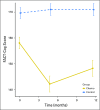Cognitive Complaints in Survivors of Breast Cancer After Chemotherapy Compared With Age-Matched Controls: An Analysis From a Nationwide, Multicenter, Prospective Longitudinal Study
- PMID: 28029304
- PMCID: PMC5455314
- DOI: 10.1200/JCO.2016.68.5826
Cognitive Complaints in Survivors of Breast Cancer After Chemotherapy Compared With Age-Matched Controls: An Analysis From a Nationwide, Multicenter, Prospective Longitudinal Study
Abstract
Purpose Cancer-related cognitive impairment is an important problem for patients with breast cancer, yet its trajectory is not fully understood. Some previous cancer-related cognitive impairment research is limited by heterogeneous populations, small samples, lack of prechemotherapy and longitudinal assessments, use of normative data, and lack of generalizability. We addressed these limitations in a large prospective, longitudinal, nationwide study. Patients and Methods Patients with breast cancer from community oncology clinics and age-matched noncancer controls completed the Functional Assessment of Cancer Therapy-Cognitive Function (FACT-Cog) at prechemotherapy and postchemotherapy and at a 6-month follow-up as an a priori exploratory aim. Longitudinal models compared FACT-Cog scores between patients and controls at the three assessments and adjusted for age, education, race, menopausal status, and baseline reading ability, anxiety, and depressive symptoms. A minimal clinically important difference cutoff determined percentages of impairment over time. Results Of patients, 581 patients with breast cancer (mean age, 53 years; 48% anthracycline-based regimens) and 364 controls (mean age, 53 years) were assessed. Patients reported significantly greater cognitive difficulties on the FACT-Cog total score and four subscales from prechemotherapy to postchemotherapy compared with controls as well as from prechemotherapy to 6-month follow-up (all P < .001). Increased baseline anxiety, depression, and decreased cognitive reserve were significantly associated with lower FACT-Cog total scores. Treatment regimen, hormone, or radiation therapy was not significantly associated with FACT-Cog total scores in patients from postchemotherapy to 6-month follow-up. Patients were more likely to report a clinically significant decline in self-reported cognitive function than were controls from prechemotherapy to postchemotherapy (45.2% v 10.4%) and from prechemotherapy to 6-month follow-up (36.5% v 13.6%). Conclusion Patients with breast cancer who were treated in community oncology clinics report substantially more cognitive difficulties up to 6 months after treatment with chemotherapy than do age-matched noncancer controls.
Figures



Comment in
-
Doctor, Now That My Chemotherapy Treatment Is Over, When Will My "Chemofog" Lift?J Clin Oncol. 2017 Feb 10;35(5):482-484. doi: 10.1200/JCO.2016.70.7497. Epub 2016 Dec 28. J Clin Oncol. 2017. PMID: 28029322 No abstract available.
References
-
- Ahles TA. Cognitive changes associated with cancer and cancer treatment. Semin Oncol Nurs. 2013;29:229–231. - PubMed
-
- Joly F, Giffard B, Rigal O, et al. Impact of cancer and its treatments on cognitive function: Advances in research from the Paris International Cognition and Cancer Task Force Symposium and update since 2012. J Pain Symptom Manage. 2015;50:830–841. - PubMed
Publication types
MeSH terms
Grants and funding
LinkOut - more resources
Full Text Sources
Other Literature Sources
Medical

